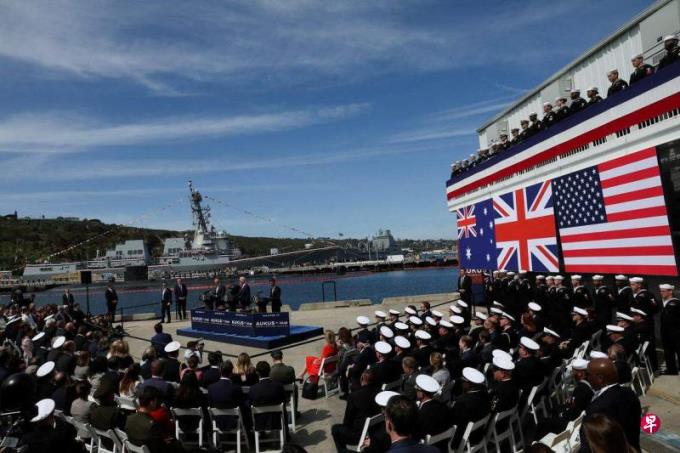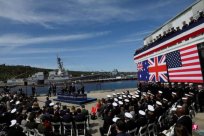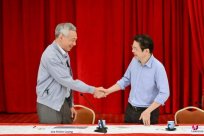
Following New Zealand and Japan, South Korea announced that it will consider joining the AUKUS cooperation project.South Korea ’s Minister of Defense Shen Yuanzheng on May 1 in Melbourne, Australia, after participating in the talks with the two -country defense minister and Foreign Minister 2+2, said at a joint press conference that South Korea and Australia discussed the possibility of South Korea participating in AUKUS’ s second pillar cooperation at the meeting.EssenceSouth Korea supports the second -pillar event, and members of AUKUS are also welcome to consider taking South Korea as the second pillar partner.As a part of the US military alliance in the Asia -Pacific region, the expansion of Aukus will inevitably strengthen the military power of the United States and improve China's ability to deter China.
North Korea's continuous missile testing and nuclear weapons test, as well as the increasingly hostile gesture of South Korea, or the motivation for South Korea to strengthen military cooperation with the United States and Japan.However, AUKUS is considered to be a coordinated Asian allies Australia, and NATO traditional allies Britain to compete in Chinese military cooperation in Asia.The joining of South Korea naturally exacerbates China's diplomatic and security dilemma.AUKUS's second pillar cooperation is to promote advanced capabilities technology projects, accelerate the coordinated development of key technologies such as hypersonic capacity and artificial intelligence, and apply these technologies to military in military.The first pillar was the US nuclear submarine deployed in Australia in Australia, a non -eccentric country, and built the next generation of nuclear submarines by Britain and Australia.
China has repeatedly expressed strong opposition to AUKUS, criticizing it to lead to the Asia -Pacific military reserve competition and destroy regional peace and stability.However, China continues to raise military expenses, as well as the control of the control of the Diaoyu Islands in the East China Sea and Japan, to step up the sea and air patrols in the Taiwan Strait to deter Taiwan, and the low -intensity conflict between China and the Philippines in the South China Sea and the Philippines.force.The military strategy of the United States in the Asia -Pacific region consists of bilateral alliances such as the United States, Japan, the United States, South Korea, the United States and the Philippines, the United States and Australia, and today's AUKUS three -sided agreement.The latest development seems to be that the United States is arranging their own independent alliances to gradually penetrate, forming a collective military system similar to NATO.
The main driving force of this development comes from the United States' response to China's rise.Since the trade war in the United States and China in 2018, the relationship between the two sides has changed sharply, from cooperation to competition and games, and even today's potential soldiers.American public opinion has also reversed China, and its hostility to China is increasing.According to data released by the poll company Piey on May 1st, 49%of Americans believe that curbing China is the primary task of US diplomacy, and 42%describe that China is an "enemy", which increases compared to five years ago.Western public opinion is portraying China, Russia, Iran and North Korea as hostile camps that threaten the interests of the United States and Western.
Although the United States has repeatedly worked hard, the reality of the geopolitical politics in Asia -Pacific means that it is necessary to establish a formal collective security organization like NATO, which is more difficult than in Europe.In 1954 after the establishment of the government in the mainland government and the outbreak of the Korean War, in 1954, in eight countries such as Thailand, the Philippines, and Australia, the Southeast Asian Convention organization formed by the NATO composition of the NATO was dissolved in 1977.There are still many variables with AUKUS as the core. There are still many variables.In any case, the peace dividend that has been 60 or 70 years after World War II is disappearing. Compared with the ideological struggle of the East and West camps and the Cold War, the confrontation intensity of the sea power and land power is increasing.It may be more severe.
U.S. Secretary of State Brills recently visited China and officially issued an ultimatum on China -Russia relations.Although Chinese President Xi Jinping visited the three European countries such as France on May 5 to try to alleviate the confrontation between China and the West, the pressure on Chinese diplomacy was still not light.The U.S. military community has repeatedly warned that the Taiwan Strait may broke out in 2027, and the United States thus intensified its military deployment in Asia -Pacific, and strengthening AUKUS is an important link among them.Once South Korea joins, China will inevitably fall into a situation of further isolation.Although the US's public position is to prevent conflicts in order to prevent the Taiwan Strait, in Beijing, this is undoubtedly a step -by -step progress for China's national security.
The results of the Russian and Ukraine War and the US presidential election in November will be the two major variables that affect Chinese and Western relations.South Korea stated that she wants to join AUKUS, just like the previous indirectly providing a large number of weapons to Ukraine through the United States.However, in view of the significance of Russia's strategic security considerations in China, Beijing has to change the threshold of changing strings in diplomatic strategies.However, the position of the West to choose the edge of China has been very clear and tough. The next challenge can only avoid direct conflicts between the two sides.Visiting China President Putin in May is the focus of observation of all parties.




